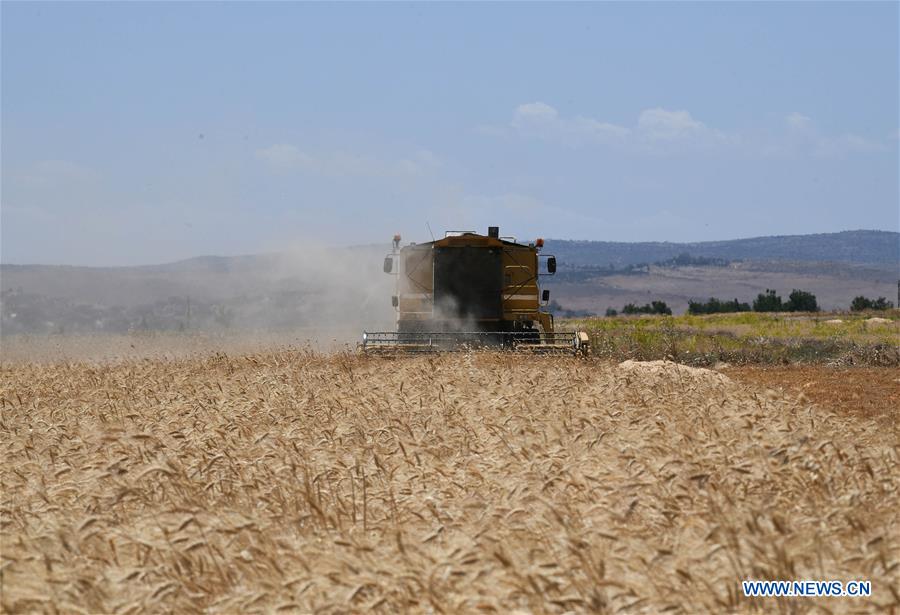
A farmer drives a harvester during wheat harvest in the town of Muhradah in Hama province, Syria, on June 13, 2020. Syria witnesses good wheat harvest this year due to suitable climate and an increase in the cultivated lands due to improved security situation, Youssef Qassem, the General Director of the Syrian Grain Establishment, told Xinhua in an interview. (Photo by Ammar Safarjalani/Xinhua)
DAMASCUS, June 17 (Xinhua) -- Syria witnesses good wheat harvest this year due to suitable climate and an increase in the cultivated lands due to improved security situation, Youssef Qassem, the General Director of the Syrian Grain Establishment, told Xinhua in an interview.
Qassem said wheat is a strategic material for the Syrian people and a basic crop in Syria as it secures the subsidized bread, which is a staple for Syrians.
"The harvest of wheat crops this year was good due to the suitable climate circumstances during the production and agricultural process," he said.
For the cultivated areas, he added, the security situation was good in terms of increasing the planted lands in Syria as a result of the Syrian military operations in many areas, which enabled farmers to return to their lands and conduct the agricultural process as needed.
About the situation in areas out of the government control in northeastern Syria, Qassem accused the U.S.-backed Kurdish militias of preventing farmers from selling their harvest to centers run by the Syrian government.
"Their checkpoints have prevented the farmers from reaching centers of the Grain Establishment. The Turkish and U.S. occupation of lands in northeastern Syria has also contributed to setting ablaze agricultural lands that belong to farmers who want to sell their crops to the Syrian government, not to the militias," he said.
He stressed that the farmers want to sell their crops to the Syrian government side after the government raised the price of one kilogram of wheat from 200 Syrian pounds to 400 in a bid to entice farmers to sell their harvest to the government side.
Regarding the sanctions imposed on Syria and the fact that Syria has imported its missing needs of wheat from Russia over the past couple of years, Qassem said the sanctions will not affect the Syrian wheat, including the new set of sanctions known as Caesar Act.
The new sanctions, which go into force this week, aim to sanction the Syrian government including President Bashar al-Assad for its alleged "war crimes" against the Syrian people.
It also target any entity that does business with the Syrian government.
Qassem said the Grain Establishment has a long experience in overcoming sanctions with the efforts of its teams, the support of the Syrian government, and friendly countries such as Russia.
"The Grain Establishment always works on storing wheat, which enabled the establishment to secure bread during the crisis, and the bread has always been available," he said.
It's worth noting that since 2011, wheat production in Syria has almost halved, declining from a pre-war average of 4.1 million tons per year to 2.2 million tons in 2019. Enditem



